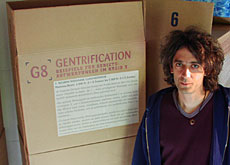Housing crisis prompts protest

Demonstrators have marched in Zurich in protest against the city's drastic housing shortage.
Organisers of the march claim that Switzerland’s financial capital has become a “closed city” for the poor and underprivileged.
Zurich’s picturesque setting and its vibrant culture scene have helped make it a regular fixture in lists of the world’s most desirable cities. But it’s that very attractiveness that is threatening to make Zurich unaffordable for those on low incomes.
Popular city
“Zurich has become extremely popular in recent years, and many areas in the centre of the city have become trendy again,” points out march organiser Thomas Stahel.
“But the resulting demand for apartments, along with the steep rise in rent, is forcing out many less privileged groups.”
Zurich’s situation is not unique among Swiss cities, but it is the most extreme.
While Bern and Geneva have approximately one empty apartment for every 200 which are occupied, the figure in Zurich is closer to one in 2,500.
Saturday’s march, which attracted 300 demonstrators, is part of a series of events organised by critics of Zurich’s current housing policy.
Round-table discussions, city tours and documentary film nights have also been taking place in a concerted attempt to highlight the current situation.
Pressure
“Since launching the ‘closed city’ campaign six months ago, we’ve attracted a lot of media attention,” says Stahel.
“Our main aim is to get the message to as many people as possible so that we can really put pressure on the politicians to change things.”
One of the highest-profile politicians to be targeted is Zurich mayor Elmar Ledergerber, who last week attended one of the podium talks arranged by the campaign organisers.
Having already launched a project to build 10,000 new apartments in Zurich within ten years, Ledergerber says the city authorities are well aware of the housing problem. But he denies the accusation that Zurich is closed to the poor.
“This is certainly not a closed city,” Ledergerber told swissinfo. “Every year we have around ten per cent of the population moving out of Zurich with the same amount of people moving in.
Bigger apartments
“One problem is that people are demanding bigger and bigger apartments and we can’t build enough new housing to keep up with that demand.”
The ‘closed city’ campaigners agree with the mayor on that point, but argue that the city could still do more to help less wealthy citizens.
While almost three-quarters of Zurich’s housing is in private hands, the remaining quarter is still owned by the state or by state-regulated cooperatives.
The latter in particular have been accused of catering excessively to higher income earners when building new houses or refurbishing existing ones.
Manifesto
While the main aim of the ‘closed city’ campaign has been to publicise the problems currently faced by Zurich, the organisers have also set out a five-point manifesto aimed at offering possible solutions to the crisis.
“We didn’t just want to criticise,” explains Stahel. “We also wanted to suggest how things might be improved.”
Among its main points, the manifesto calls for a greater emphasis on cheap accommodation within the city’s new building programme and also for smaller rent rises following the renovation of existing properties.
The manifesto’s authors also want private construction companies to earmark 20 per cent of the floor surface in new apartment blocks for the provision of affordable accommodation.
Benefits
The manifesto is clearly aimed at helping the city’s poor and underprivileged, but the ‘closed city’ campaigners insist that they are also thinking about the benefits for Zurich as a whole.
“It is important for any city to have a good social mix,” argues Stahel, “and a city full of only rich people would soon become superficial and bland.
“Besides, the people who are being forced out of Zurich are the same people who clean the offices or take the rubbish off the streets. If they are pushed away, the city won’t be able to function.”
swissinfo, Mark Ledsom in Zurich
Saturday’s planned demonstration is part of a series of events organised by critics of Zurich’s housing policy.
Campaigners blame the current situation on increased demand for larger apartments and sharp rent rises.
Less than one flat in 2,500 is currently empty in Zurich.

In compliance with the JTI standards
More: SWI swissinfo.ch certified by the Journalism Trust Initiative










You can find an overview of ongoing debates with our journalists here . Please join us!
If you want to start a conversation about a topic raised in this article or want to report factual errors, email us at english@swissinfo.ch.